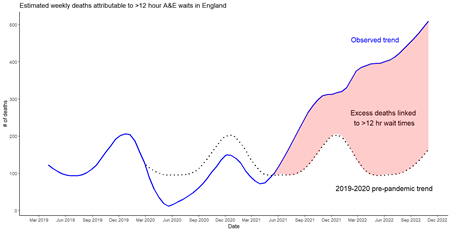Revealed: Crisis in A&E departments drives 15,000 deaths
Exclusive: ‘Pressures are leading directly to hundreds of additional deaths each week, with little chance of the situation improving,’ says data analyst
Your support helps us to tell the story
From reproductive rights to climate change to Big Tech, The Independent is on the ground when the story is developing. Whether it's investigating the financials of Elon Musk's pro-Trump PAC or producing our latest documentary, 'The A Word', which shines a light on the American women fighting for reproductive rights, we know how important it is to parse out the facts from the messaging.
At such a critical moment in US history, we need reporters on the ground. Your donation allows us to keep sending journalists to speak to both sides of the story.
The Independent is trusted by Americans across the entire political spectrum. And unlike many other quality news outlets, we choose not to lock Americans out of our reporting and analysis with paywalls. We believe quality journalism should be available to everyone, paid for by those who can afford it.
Your support makes all the difference.The crisis in Britain’s A&E departments has been linked to more than 15,000 deaths in 18 months, with as many as 500 patients a week dying because of long waits for emergency care.
Expert analysis shows that the number of avoidable deaths has been three times as high as it would have been if hospital waits for emergency treatment had stayed at pre-pandemic levels.
Internal NHS data obtained by The Independent shows that the number of patients forced to wait for more than 12 hours in A&E has quadrupled since April 2019.
Health leaders have called for the government to step up action to lead the service out of the crisis.
It comes as A&E departments and ambulances have endured one of the toughest weeks on record, with thousands of ambulance staff, nurses and healthcare workers on strike. It was announced on Friday that further nursing walkouts will take place on 18 and 19 January.
Leading up to the strike days this week, hospitals and ambulance trusts across the country declared critical incidents due to “overwhelming” pressure, while health leaders warned that the NHS was close to “overheating” during one of its darkest ever winters.
Royal College of Emergency Medicine president Dr Adrian Boyle said: “Multiple scientific studies have shown that long waits in emergency departments are associated with increased mortality. The delay and dilution of medical and nursing care is dangerous.
“These figures from respected independent experts confirm what many emergency physicians have suspected for a long time. This problem is fixable: we had similar problems in the late 1990s and were able to fix this by 2005. It required political will and leadership to tackle the problem.”
LCP Health Analytics looked at the NHS data alongside Office for National Statistics figures for excess deaths – that is, deaths over and above what would be expected for the time of year. Its analysis found a widening gap between projections based on pre-pandemic levels of care and the true number of excess deaths. By October this year, there were 500 excess deaths a week compared with a prediction of 150 without the emergency care crisis.
The data analysis, carried out by actuaries Natalie Tikhonovsky and Stuart McDonald, suggests that the situation in emergency departments began to deteriorate dramatically in April 2021 after a lull between May 2020 and March 2021. Since April 2021, excess deaths linked to A&E departments have rocketed from 100 to just over 500 a week in October.

Mr McDonald, who is head of longevity and demographic insights at LCP Health Analytics, said: “The NHS has been facing extraordinary pressure for a prolonged period, and this can be seen in measures such as ambulance response times and A&E waiting times, which are significantly worse than seasonal norms. Our analysis shows how these pressures are leading directly to hundreds of additional deaths each week, with little chance of the situation improving over the winter months.”
The potential link between the crisis in emergency care and excess deaths was previously analysed by the Financial Times.
LCP Health Analytics also looked at excess deaths in relation to ambulance delays, but it did not find a significant correlation. However, monthly data from the Association of Ambulance Chief Executives suggests that more than 4,000 patients a month are coming to harm as a result of ambulance delays outside emergency departments and delays in response times.
Dr Louella Vaughan, a senior clinical fellow at think tank the Nuffield Trust, said: “More patients are waiting longer in NHS accident and emergency departments to be admitted into hospital than at any time since records began.
“The consequences of increasing waits are felt right across health and care. Overcrowded emergency departments and overworked staff are struggling to provide timely care. Ambulance crews are unable to hand over patients due to lack of space in A&E, which delays them responding to other life-threatening conditions. It is a vicious cycle to which urgent solutions are needed.
“The deterioration of the social care system, and lack of investment in care outside of hospital, is the root of the problem. Staff are simply unable to free up beds fast enough by discharging patients who are medically well home safely, or fast enough. This has been compounded by the exodus of medical and nursing staff due to concerns over pay and the increasingly unsafe conditions, [along with] high rates of staff sickness, and ongoing Covid precautions, which slows down the delivery of services.”
The Department of Health and Social Care was contacted for comment.





Join our commenting forum
Join thought-provoking conversations, follow other Independent readers and see their replies
Comments